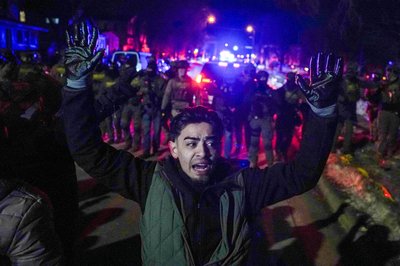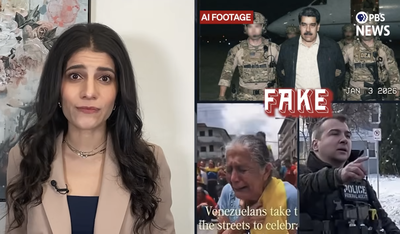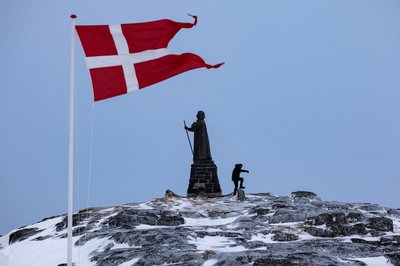NOTE: If you are short on time, watch the video and complete this bell ringer activity: What did you notice? What did the story make you think about? What would you want to learn more about?
SUMMARY
The world of K-pop has fresh new faces: the band 1VERSE with a debut album and lead single, “Shattered.” The boy band has an improbable origin story that includes two North Korean defectors.
View the transcript of the story.
News alternative: Check out recent segments from the News Hour, and choose the story you’re most interested in watching. You can make a Google doc copy of discussion questions that work for any of the stories here.
Key terms
defector — someone who leaves their country, organization or group, often for political or personal reasons.
WARM-UP QUESTIONS
- Who is Yu Hyuk, and what hardships did he experience in North Korea?
- What is the title of 1VERSE’s lead single?
- How does this lead single reflect Yu Hyuk’s personal life and past experiences?
- Which global hit inspired Kim Seok to pursue music?
- When did Kim Seok escape from North Korea?
FOCUS QUESTIONS
- In what ways can music act as a form of protest or resistance?
- Why do you think music and art are such powerful tools for people who have experienced trauma or hardship?
Media literacy: If you were a journalist interviewing Yu Hyuk and Kim Seok, what else would you want to ask them, and why? What parts of their stories would you want to explore further to better understand how their past experiences have shaped who they are today?
WHAT STUDENTS CAN DO
Design a Magazine Cover Activity
Assignment: Use credible sources to research more about the life of either Yu Hyuk or Kim Seok, and then design a magazine cover (using either paper or a free online platform like Canva) to highlight their personal story and journey to becoming a member of 1VERSE.
Your magazine cover should include:
- An image or drawing of your chosen 1VERSE member (either Yu Hyuk or Kim Seok)
- An attention-grabbing title and subtitle
- 6–7 sentences about your chosen 1VERSE member’s life, including why and how they left North Korea, any challenges they faced after escaping, how they first became involved with music, their journey to joining 1VERSE, etc.
- A list of the credible sources you used for your research
NEWS: THEN & NOW
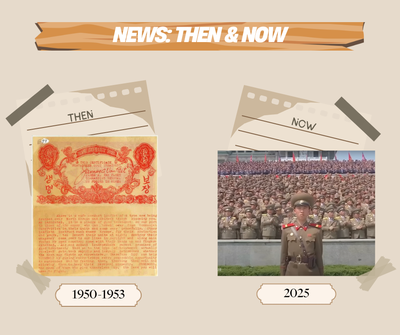
Then:
The Korean War began in 1950 when North Korean communist forces invaded South Korea. The conflict involved North Korea and its allies, the Soviet Union and China, fighting against South Korea, who was backed by the United States and a coalition of United Nations forces (Britannica).
The war caused millions of deaths and ended in 1953 with an armistice (an agreement between parties to stop fighting), but no formal peace treaty (Britannica).
During the war, millions of propaganda leaflets were dropped over enemy lines in order to weaken enemy morale and encourage surrender (Korean War Propaganda Leaflet Collection at the Library of Congress).
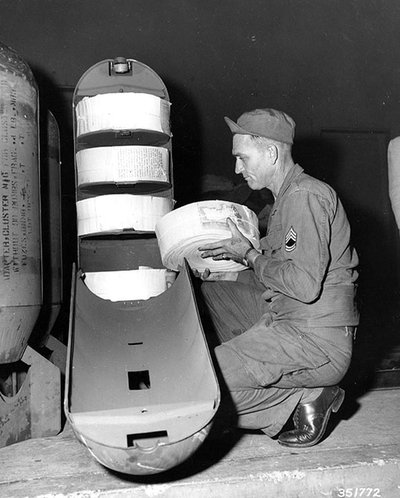
The image above shows a U.S. soldier loading a leaflet bomb, a device designed to spread up to 22,500 propaganda leaflets over a wide area when dropped from an aircraft (Korean War Propaganda Leaflet Collection at the Library of Congress).
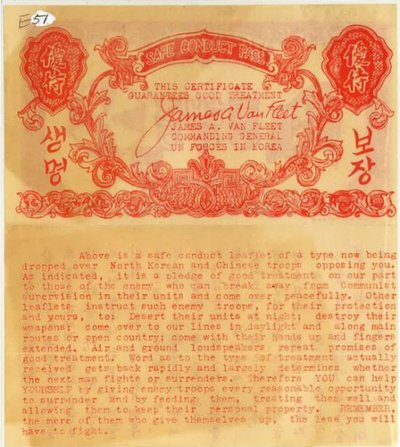
This image shows a "Safe Conduct Pass" leaflet created by the United Nations during the Korean War. The leaflet urges enemy troops to surrender by explaining how to do so and assuring them that they will be treated well if they comply. It also provides instructions for UN soldiers on how to properly treat North Korean or Chinese soldiers who choose to surrender.
Click here to view a PDF with a transcription of the leaflet text (Korean War Propaganda Leaflet Collection at the Library of Congress).
Now:
Today, North and South Korea remain sharply divided. North Korea is a tightly controlled dictatorship that prohibits access to outside media (including South Korean media) and enforces harsh punishments on those who violate these restrictions. Severe food shortages, restricted personal freedoms, and constant government surveillance lead some North Koreans to risk escape to South Korea (Human Rights Watch).
Discussion questions:
- Why do you think the Korean War is often referred to as "The Forgotten War," and in what ways does its legacy continue to impact the world today?
- Take a closer look at the "Safe Conduct Pass" leaflet, and be sure to read the full text. Do you think this was an effective method for encouraging enemy soldiers to surrender? Why or why not?
- In what ways do the strategies used during the Korean War (like propaganda leaflets) compare to how information is controlled or spread in North Korea today?
- What impact do you think limited access to outside information has on the daily lives and worldviews of people living in North Korea?
Written by Brooke Ingemi, PBS News Hour Classroom's intern and senior at Amherst College, and News Hour's Vic Pasquantonio.
Fill out this form to share your thoughts on Classroom’s resources.
